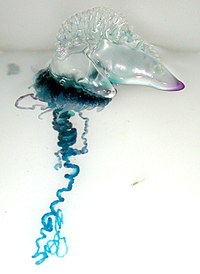
Photo from wikipedia
This study is a secondary data analysis that extends knowledge about the effects of the early childhood Family Check-Up (FCU) intervention to trajectories of general psychopathology problems (p factor) across… Click to show full abstract
This study is a secondary data analysis that extends knowledge about the effects of the early childhood Family Check-Up (FCU) intervention to trajectories of general psychopathology problems (p factor) across early and middle childhood, and effects on adolescent psychopathology and polydrug use. The Early Steps Multisite study (ClinicalTrials.gov Identifier NCT00538252) is a randomized controlled trial of the FCU and consists of a large, racially and ethnically diverse sample of children who grew up in low-income households in Pittsburgh, Pennsylvania; Eugene, Oregon; and Charlottesville, Virginia (n = 731; 49% female; 27.6% African American, 46.7% European American, 13.3% Hispanic/Latinx). To represent a comorbid presentation of internalizing and externalizing problems, we fit a bifactor model that included a general psychopathology (p) factor at eight ages in early childhood (ages 2-4), middle childhood (ages 7.5-10.5), and adolescence (age 14). Latent growth curve modeling was conducted to examine trajectories of the p factor across ages within the developmental periods of early and middle childhood. The effects of FCU on the reductions in growth in the childhood p factor had cascading effects on adolescent p factor (i.e., within-domain effect) and polydrug use (i.e., across-domain effect). Findings underscore the utility of the early FCU in preventing a host of maladaptive adolescent outcomes across diverse settings and populations. (PsycInfo Database Record (c) 2023 APA, all rights reserved).
Journal Title: Developmental psychology
Year Published: 2023
Link to full text (if available)
Share on Social Media: Sign Up to like & get
recommendations!